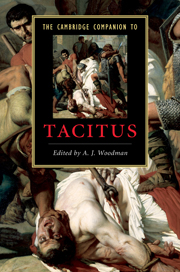Introduction
Published online by Cambridge University Press: 28 March 2010
Summary
In the year 17 the Cheruscan chief Arminius, revered as a founding figure by Germans of later ages and commemorated in the nineteenth century by massive monuments in the Teutoburg Forest and Minnesota, was engaged in exchanging insults with his rival, Maroboduus. This, at least, is what we are told by Tacitus, who says that Arminius called Maroboduus 'a fugitive and inexperienced in battle, one who had been protected by his lair in Hercynia . . . and was a betrayer of his fatherland and a satellite of the Roman emperor' (A. 2.45.3): “fugacem Maroboduum appellans, proeliorum expertem, Hercyniae latebris defensum, . . . proditorem patriae, satellitem Caesaris.” Although Tacitus has told us earlier that Arminius had formerly been a soldier in the Roman army and could speak Latin (2.10.3), it seems unlikely that a German warrior would be so familiar with Virgil's Georgics that he was able to describe Maroboduus in the same terms as Virgil had used to describe a skulking snake (3.544-5 'frustra defensa latebris | uipera', 'the viper vainly protected by its lair'). Of course verisimilitude is not to be expected from the speeches of barbarians portrayed in Latin historical texts: when a chief of the Britons says 'where they make a desert, they call it peace' (Agr. 30.5 'ubi solitudinem faciunt, pacem appellant'), he alludes to a speech in Book 8 of Livy, an allusion no doubt undetected by the majority of the modern politicians whose repetition of Tacitus' statement has turned it into one of the most high-profile quotations of the age.
- Type
- Chapter
- Information
- The Cambridge Companion to Tacitus , pp. 1 - 14Publisher: Cambridge University PressPrint publication year: 2010
- 5
- Cited by



